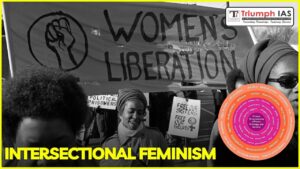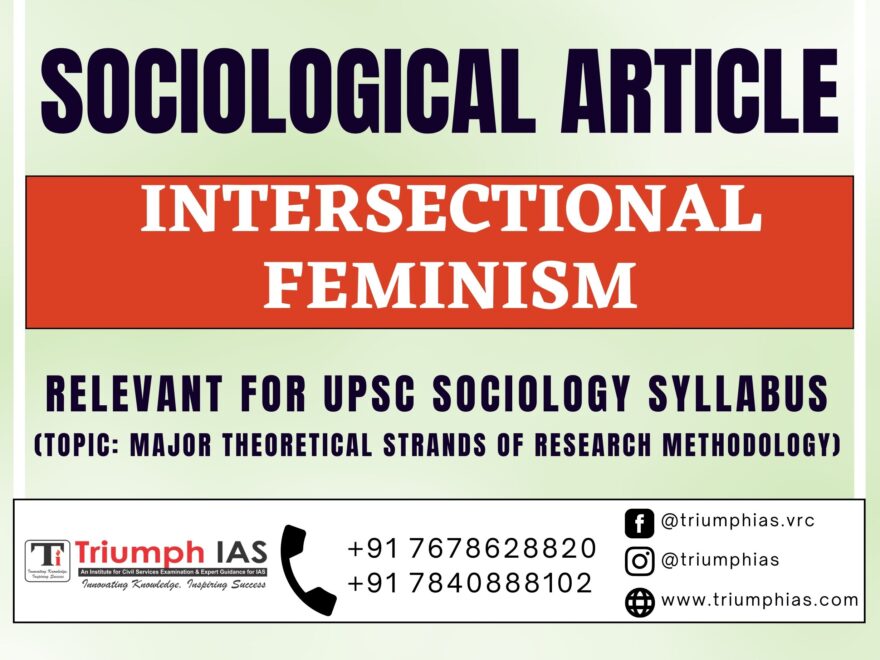INTERSECTIONAL FEMINISM
(Relevant for UPSC Sociology Syllabus – Topic : Major Theoretical Strands of Research Methodology)

Intersectional feminism is a type of feminism that recognizes the interconnected nature of social identities and how they interact with systems of oppression. It acknowledges that individuals have multiple identities such as race, gender, class, sexual orientation, religion, ability, and more, and that these identities can intersect and impact their experiences in unique ways. Intersectional feminism seeks to understand and address the ways in which these identities intersect with systems of oppression, such as racism, sexism, ableism, and homophobia, among others.
Intersectional feminism emerged as a response to the limitations of traditional feminist movements that were largely dominated by white, middle-class, cisgender women. These movements failed to recognize and address the experiences of women from marginalized communities, such as women of color, queer women, and women with disabilities. Intersectional feminism seeks to center the experiences of these marginalized groups and recognizes that their experiences are often vastly different from those of privileged groups.
Intersectional feminism is a term coined by scholar and activist Kimberlé Crenshaw in 1989 in her paper “Demarginalizing the Intersection of Race and Sex: A Black Feminist Critique of Antidiscrimination Doctrine, Feminist Theory and Antiracist Politics.” In this paper, Crenshaw argued that black women face a unique form of oppression that is not adequately addressed by either feminist or anti-racist movements.
Intersectional feminism has become increasingly popular in recent years, as more people have recognized the need to address the multiple forms of oppression that individuals may face. It has been embraced by a diverse range of activists and scholars, and has been used to inform policy and activism around issues such as reproductive rights, police brutality, and economic inequality.
One of the key principles of intersectional feminism is the recognition that different forms of oppression are interconnected and cannot be addressed in isolation. For example, racism and sexism often intersect, creating unique experiences of oppression for women of color. Likewise, ableism and heterosexism can intersect, leading to the marginalization of disabled queer individuals. Intersectional feminism seeks to address these interconnected forms of oppression, rather than addressing them as separate issues.
Another important principle of intersectional feminism is the recognition of privilege and the need for allies to use their privilege to support marginalized communities. Privilege refers to the advantages and benefits that individuals may have based on their social identities. For example, white people have white privilege, men have male privilege, and cisgender individuals have cisgender privilege. Intersectional feminism recognizes that individuals with privilege can use their privilege to advocate for and support marginalized communities, and that they have a responsibility to do so.
Intersectional feminism has also been criticized for being too focused on identity politics and for not adequately addressing issues related to class and capitalism. Some critics argue that intersectional feminism has become too focused on individual identities, rather than addressing the systemic issues that lead to oppression. However, proponents of intersectional feminism argue that these criticisms are misguided and that intersectional feminism is focused on addressing the root causes of oppression, which includes systemic issues related to class and capitalism.
Conclusion: Intersectional feminism is a significant concept that has emerged in recent years to address the limitations of traditional feminist movements. It recognizes that individuals have multiple social identities that intersect and impact their experiences in unique ways. The movement seeks to understand and address the ways in which these identities intersect with systems of oppression, such as racism, sexism, ableism, and homophobia, among others. While critics argue that intersectional feminism is too focused on identity politics and does not address systemic issues related to class and capitalism, proponents argue that it is focused on addressing the root causes of oppression. Overall, intersectional feminism is a crucial movement that seeks to address the unique experiences of marginalized communities and acknowledges the need for allies to use their privilege to support these communities.
-
Follow us :
🔎 https://www.instagram.com/triumphias
🔎https://www.youtube.com/c/TriumphIAS
https://t.me/VikashRanjanSociology
Find More Blogs
Scope of the subject and comparison with other social sciences
Changing family structure in India Modernity and social changes in Europe
UPSC Sociology Syllabus, Major Theoretical Strands of Research Methodology, feminism, racism, sexism, ableism, homophobia, Kimberlé Crenshaw, policy, activism, identity politics, class, capitalism, intersectional feminism, social identities, systems of oppression, marginalized communities, privilege,#Sociologyforupsc #sociologyforupscinhindi #sociologyforupscgs1 #sociologyforupscprelims #sociologyforupscinenglish #sociologyforupscmainsinhindi #sociologyforupscoptionalinhindi #sociologyforupscmains #sociologyforupscplaylist #sociologyforupsclecture1 #sociologyforupsccse #sociologyforupscoptional #syllabusofsociologyforupscoptional #bestbookforsociologyforupsc #sociologyoptionalforupscanswerwriting #sociologyoptionalforupscanukumari #sociologyoptionalforupscabhijeet #sociologyoptionalforupscanalysis #sociologyoptionalforupscalllectures #sociologysyllabusforupscanalysis


One comment